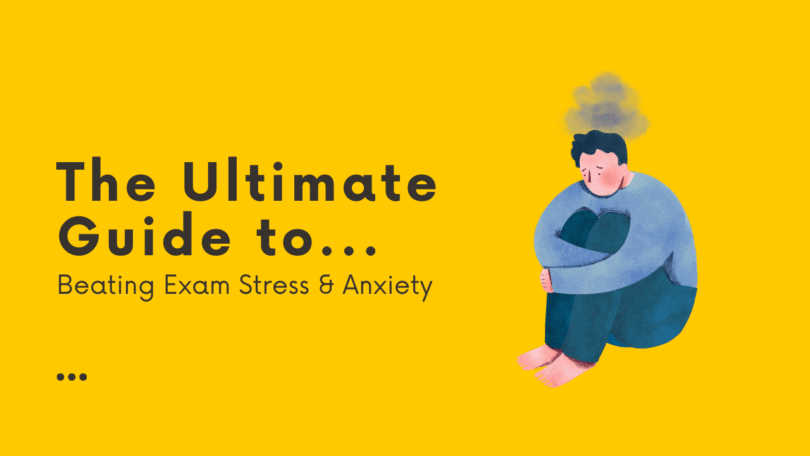The pressure of exams can feel overwhelming. For many students, the lead-up to an exam is filled with late-night cramming, racing thoughts, and a sense of dread that can make it difficult to focus and perform at your best. While a little bit of stress can be a motivator, chronic anxiety can be detrimental to your mental health and academic performance. This guide provides actionable strategies to help you manage and overcome exam stress and anxiety, so you can approach your tests with confidence.
1. Plan and Prepare Thoroughly (The Proactive Approach)
One of the most significant sources of exam anxiety is the feeling of being unprepared. By taking control of your study schedule, you can replace a feeling of panic with one of confidence.
- Create a Study Schedule: Start well in advance of the exam date. Break down the material into manageable chunks and assign specific topics to each day. This not only makes the task less daunting but also ensures you cover everything without last-minute panic.
- Don’t Cram: Cramming is a primary cause of stress. It overloads your brain and leads to shallow understanding and poor retention. Instead, use spaced repetition and regular review sessions to solidify your knowledge.
- Practice with Past Papers: Familiarize yourself with the exam format, question types, and time constraints by working through past papers. This reduces the unknown on exam day and helps you feel more comfortable and ready.
2. Prioritize Self-Care (The Body-Mind Connection)
Your physical well-being is directly linked to your mental state. Neglecting your health during stressful periods will only amplify anxiety.
- Sleep is Non-Negotiable: Pulling all-nighters might seem productive, but it’s a terrible strategy. Lack of sleep impairs cognitive function, memory, and emotional regulation. Prioritize 7-9 hours of quality sleep to ensure your brain is rested and ready to perform.
- Eat Nutritious Foods: Avoid relying on sugary snacks and caffeine highs. A balanced diet rich in fruits, vegetables, and lean protein will provide your brain with the sustained energy it needs. Stay hydrated by drinking plenty of water.
- Move Your Body: Exercise is one of the most effective ways to reduce stress. Even a short walk, a quick jog, or a yoga session can release endorphins, reduce cortisol (the stress hormone), and clear your mind.
3. Practice Mindfulness and Breathing Techniques
When anxiety strikes, your body enters a “fight-or-flight” response, leading to a racing heart, shallow breathing, and a clouded mind. You can counteract this with simple mindfulness and breathing exercises.
- Deep Breathing: When you feel overwhelmed, take a moment to breathe deeply. Inhale slowly through your nose for a count of four, hold for a count of seven, and exhale completely through your mouth for a count of eight. Repeat this a few times to calm your nervous system.
- Mindfulness Meditation: Even 5-10 minutes of daily mindfulness can make a huge difference. Focus on your breath and observe your thoughts without judgment. This practice helps you stay grounded and present, rather than getting lost in anxious “what if” scenarios.
- Positive Self-Talk: Challenge negative thoughts. Instead of thinking, “I’m going to fail,” reframe it as, “I have prepared well, and I will do my best.” Affirmations can help shift your mindset from a place of fear to one of confidence.
4. Manage Your Environment and Time
Your surroundings and daily habits can either fuel or diminish your anxiety.
- Create a Distraction-Free Zone: Designate a quiet, organized space for studying. Keep your phone out of sight, and use website blockers if necessary. A tidy environment can lead to a more organized mind.
- Set Realistic Goals: Don’t try to master an entire subject in one day. Break down your study plan into achievable daily goals. Crossing off small tasks from your to-do list provides a sense of accomplishment that builds momentum and reduces stress.
- Take Regular Breaks: The Pomodoro Technique (25 minutes of focused work, 5-minute break) is a great way to prevent burnout. Stepping away from your desk for a few minutes can refresh your mind and improve your focus when you return.
5. Seek Support and Stay Connected
Remember that you are not alone. Sharing your feelings with others can be a powerful way to reduce the burden of anxiety.
- Talk to Friends and Family: Share your worries with people you trust. Sometimes just talking about what’s stressing you out can make it feel more manageable.
- Connect with Classmates: Form study groups to share notes, discuss difficult topics, and quiz each other. Collaborative learning can make studying less isolating and more effective.
- Utilize University Resources: Many schools have counseling services, academic advisors, and mental health support that can provide professional guidance on managing stress and anxiety. Don’t hesitate to reach out if you feel overwhelmed.
By combining proactive preparation with self-care, mindfulness, and a strong support system, you can effectively navigate the pressures of exam season. Remember, your worth is not determined by a single test score. Approach your exams with a clear mind and a calm spirit, knowing you have done your best.







